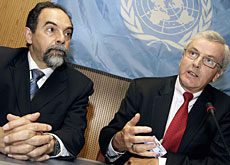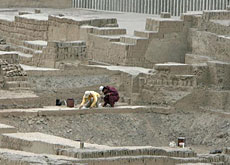Aid efforts get underway after Peru quake

Rescue operations are underway in Peru to reach the victims of a powerful earthquake that killed hundreds of people and destroyed buildings and roads.
The Geneva-based International Federation of Red Cross and Red Crescent Societies sent emergency supplies, while Swiss experts evaluate the situation and help coordinate aid in the devastated region.
A first team of local aid specialists travelled to the central coastal region of Peru immediately after the tremor struck on Wednesday night local time, said the Swiss Agency for Development and Cooperation (SDC).
A second group of four SDC staff left for Peru on Friday.
But there were no plans to send Swiss rescuers at the moment because the Peruvian government had not asked for international aid, said SDC spokesman Jean-Philippe Jutzi.
Peru has been a priority country of Swiss aid for more than four decades. The SDC and other Swiss government agencies are involved in development cooperation, humanitarian assistance. They also promote good governance and sustainable economic growth.
Rising toll
The Red Cross and Red Crescent Movement announced two aircraft carrying tents, plastic sheeting, blankets against the winter cold and water containers for around 2,000 families were on their way to the town of Pisco.
Teams of the Peruvian Red Cross took nearly seven hours – three times as long as it would normally have taken – to reach the affected area, according to Giorgio Ferrario, head of the Peruvian Federation of the Red Cross and Red Crescent.
“We know for the moment, according to local authorities, that at least 350 people are dead, but the toll will certainly rise,” a federation statement said.
A senior United Nations official later in the day put the figure at 450 dead and 1,500 injured.
The UN released $1 million (SFr1.2 million) to help the victims, while the Peruvian government called for meetings with the donor community in Lima to mobilize additional resources.
Hospitals overwhelmed
The centre of the destruction was in Peru’s southern desert, about 300 kilometres south of the capital, Lima.
The oasis city of Ica and the nearby port of Pisco were among the hardest-hit by the tremor, which measured eight on the Richter scale.
The mayor of Pisco estimated that at least 200 people were buried in the rubble of a church and that 70 per cent of the town is in ruins.
“We don’t have lights, water, communications. Most houses have collapsed,” said the mayor who was visibly upset.
In Ica, a city of 120,000, about every fourth building was destroyed.
Hospitals in the region were overwhelmed with injured, and dead bodied were gathered on street corners in Pisco, witnesses said.
Giant cracks and fallen power lines blocked the main roads south of Lima and to the Andes mountains.
Wednesday’s tremor was closely followed by nine aftershocks. In Lima, people felt two waves that lasted about 20 seconds each.
Peru’s president, Alan Garcia, declared a state of emergency and sent condolences to the families of the victims. He added the country had narrowly escaped an even greater disaster.
In 1970, one of the world’s deadliest tremors killed an estimated 50,000 people in Peru in devastating avalanches of ice and mud that buried the town of Yungay.
swissinfo with agencies
The earthquake measured 8.0 on the Richter scale.
The main tremor on Wednesday night was followed by nine aftershocks.
Its epicentre was 145km south of the capital Lima.
The death toll is expected to reach more than 450 with hundreds of injured.
Peru was the first priority country for Swiss development cooperation in Latin America.
Last year humanitarian and technical aid to Peru totalled SFr15.9 million ($13.09 million). This year it is expected to drop to SFr13.4 million.
Development aid is focussing on the three mountain areas of Cajamarca, Cusco and Apurimac.

In compliance with the JTI standards
More: SWI swissinfo.ch certified by the Journalism Trust Initiative


You can find an overview of ongoing debates with our journalists here . Please join us!
If you want to start a conversation about a topic raised in this article or want to report factual errors, email us at english@swissinfo.ch.